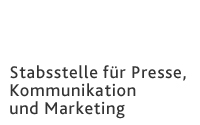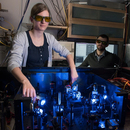Executive Department for
Press, Communication and Marketing
Adolf-Reichwein-Straße 2a Gebäude AVZ (Gebäudeteil AR-NA) 57068 Siegen
Phone: +49 (0)271/740-4915 Fax.: +49 (0)271/740-4911 E-Mail: presse@uni-siegen.de
Collaborative project of quantum computer developers
New ATIQ project is funded by the German Federal Ministry of Education and Research with a total volume of EUR 44.5 million.
Quantum computers promise unprecedented computing power for applications where conventional data processors based on „zeros and ones“ fail. In the new Trapped-Ion Quantum Computer for Applications (ATIQ) project, 25 partners from research institutions are now working together with industrial partners to develop quantum computer demonstrators implemented together with users of quantum computers. The partners will tackle major technical challenges to realize quantum computer demonstrators made in Germany and to facilitate 24/7 access for users. The German Federal Ministry of Education and Research (BMBF) is funding the project with a total of EUR 37.4 million.
The ATIQ project aims to develop a first generation of reliable, user-friendly quantum computing demonstrators based on ion trap technology available 24/7 within 30 months. To this end, the leading groups in ion trap research at the universities of Hannover/ Braunschweig, Siegen, and Mainz have joined forces with research institutions and industrial partners. „We want to take the next big step together. ATIQ is intended to be the crystallization point for a German ecosystem of ion trap quantum technology, bringing together technology partners, research, and users resulting in relevant commercial exploitation,“ said project coordinator Professor Christian Ospelkaus of Leibniz University Hannover and Physikalisch-Technische Bundesanstalt (PTB) in Braunschweig, summarizing the motivation for this project.
„Instead of classical bits, a quantum computer uses qubits, for which ions are the ideal storage medium. We develop the best control of these qubits, even in large quantum registers,“ said Professor Dr. Christof Wunderlich from the University of Siegen. „Especially if you combine a classical high-performance computer with such a quantum coprocessor, this team is unbeatable for new computing tasks“ adds Professor Ferdinand Schmidt-Kaler from the University of Mainz.
Robust and scalable quantum hardware
ATIQ has enormous potential for economic and scientific success. Quantum computers promise unprecedented computing power for applications where classical high-performance computers by themselves fail completely. The combination of classical high-performance computing and quantum computing, on the other hand, opens up completely new applications. Thus there is an urgent need for Germany to provide robust and scalable quantum hardware. The ATIQ consortium aims to optimize hardware for applications in chemistry. Novel chemical substances and the reactions necessary to produce them could then be simulated on quantum computers. They could also be applied in finance, paving the way for new approaches in credit risk assessment.
The core of the ATIQ quantum processor is based on ion trap technology, which is recognized worldwide as one of the most promising routes to quantum computing. However, current systems are complex laboratory machines requiring considerable maintenance and calibration efforts by highly qualified personnel. ATIQ addresses these technical challenges to manage continuous operation with reliable, high-quality computing operations. For this purpose, the ATIQ consortium, in collaboration with technology and industry partners, optimizes the control of the processors with electronic and optical signals, thus enabling external users to execute computing algorithms independently. Furthermore, such optimization may be used for upscaling the quantum demonstrators from an initial 10 to more than 100 qubits.
The consortium’s strength is based on the expertise as developers of the ion trap technology as well as on physical and technical fundamentals at the universities and research institutions of Leibniz University Hannover / PTB Braunschweig, Johannes Gutenberg University Mainz, and the University of Siegen together with other research facilities, strong industry and technology partners as well as users and alliances such as the Quantum Valley Lower Saxony.
About the project
The collaborative project ATIQ – Trapped-Ion Quantum Computer for Applications is part of the BMBF funding initiative on Quantum Computer Demonstration Setups. The project will be funded from 1 December 2021 until 30 November 2026 to the tune of EUR 44.5 million. ATIQ is coordinated by Leibniz University Hannover and brings together the expertise of 25 partners, including Johannes Gutenberg University Mainz, the University of Siegen, TU Braunschweig, RWTH Aachen University, Physikalisch-Technische Bundesanstalt (PTB), and Fraunhofer-Gesellschaft with AMO GmbH, AKKA Industry Consulting GmbH, Black Semiconductor GmbH, eleQtron GmbH, FiberBridge Photonics GmbH, Infineon Technologies AG, JoS QUANTUM GmbH, LPKF Laser & Electronics AG, Parity Quantum Computing Germany GmbH, QUARTIQ GmbH, Qubig GmbH, and TOPTICA Photonics AG. Associate partners include AQT Germany GmbH, Boehringer Ingelheim, Covestro AG, DLR-SI, Volkswagen AG, and QUDORA Technologies GmbH.


